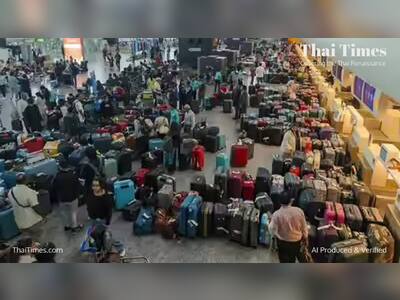Thai Economy Faces Challenges Amid US Tariffs
US tariffs expected to impact Thailand's export growth, with potential effects on investment and production decisions
Thailand's economic growth is anticipated to be affected by US tariffs on its exports.
A senior central bank official stated that the impact will not be as severe as during the Covid-19 pandemic but could be significant and prolonged.
The US tariffs have halted some production and delayed investment decisions, with their effect on Thailand's exports expected to be seen in the second half of the year.
Global trade policy uncertainty is considered a large and prolonged shock that will affect Thailand in various ways.
Initially, GDP growth was projected to be over 2.5% for this year, but due to the tariff's impact, growth is now expected to be lower than 2.5%.
The central bank forecasts export growth of 2-3% this year, with the tariffs' primary effects likely to be felt more strongly next year if they go ahead.
In the worst-case scenario, exports could contract next year.
The US tariffs will affect Thailand through five main channels: financial markets, investment, exports, increased competition, and a potential global economic slowdown.
Key domestic industries expected to bear the brunt include agriculture, machinery and equipment, automotive and auto parts, electrical appliances, and electronics.
Exports to the US account for 18% of Thailand's total exports and around 2.2% of GDP. The central bank has surveyed local businesses in the affected industries and found that many have adopted a wait-and-see approach in terms of business and investment decisions.
Some businesses have already delayed new investment plans while awaiting further clarity, and there is a risk that production bases may be relocated if Thailand faces higher tariffs compared to other countries.
Inflation is likely to fall due to supply-side factors, with no pressure on monetary policy.
A senior central bank official stated that the impact will not be as severe as during the Covid-19 pandemic but could be significant and prolonged.
The US tariffs have halted some production and delayed investment decisions, with their effect on Thailand's exports expected to be seen in the second half of the year.
Global trade policy uncertainty is considered a large and prolonged shock that will affect Thailand in various ways.
Initially, GDP growth was projected to be over 2.5% for this year, but due to the tariff's impact, growth is now expected to be lower than 2.5%.
The central bank forecasts export growth of 2-3% this year, with the tariffs' primary effects likely to be felt more strongly next year if they go ahead.
In the worst-case scenario, exports could contract next year.
The US tariffs will affect Thailand through five main channels: financial markets, investment, exports, increased competition, and a potential global economic slowdown.
Key domestic industries expected to bear the brunt include agriculture, machinery and equipment, automotive and auto parts, electrical appliances, and electronics.
Exports to the US account for 18% of Thailand's total exports and around 2.2% of GDP. The central bank has surveyed local businesses in the affected industries and found that many have adopted a wait-and-see approach in terms of business and investment decisions.
Some businesses have already delayed new investment plans while awaiting further clarity, and there is a risk that production bases may be relocated if Thailand faces higher tariffs compared to other countries.
Inflation is likely to fall due to supply-side factors, with no pressure on monetary policy.











